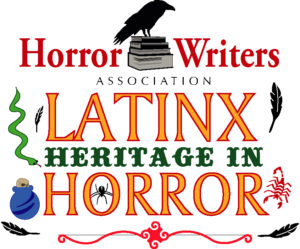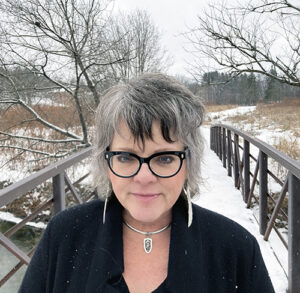Latinx in Horror: Interview with Ann Dávila Cardinal

 Ann Dávila Cardinal is a writer and the Director of Recruitment for Vermont College of Fine Arts where she earned her MFA in Writing. She comes from a long line of Puerto Rican writers, including father and son poets Virgilio and José Antonio Dávila, and her cousin, award-winning fiction writer Tere Dávila. Her young adult horror novels include Five Midnights, Category Five, and the upcoming Breakup From Hell (1/3/23). The Storyteller’s Death, (10/4/22), a work of magical realism, is her first novel for adults. Ann lives with her husband in Vermont in a small house with a scary basement.
Ann Dávila Cardinal is a writer and the Director of Recruitment for Vermont College of Fine Arts where she earned her MFA in Writing. She comes from a long line of Puerto Rican writers, including father and son poets Virgilio and José Antonio Dávila, and her cousin, award-winning fiction writer Tere Dávila. Her young adult horror novels include Five Midnights, Category Five, and the upcoming Breakup From Hell (1/3/23). The Storyteller’s Death, (10/4/22), a work of magical realism, is her first novel for adults. Ann lives with her husband in Vermont in a small house with a scary basement.
What inspired you to start writing?
Family stories. Cuentos. My mother passed before my son was born, and I wanted to document my Puerto Rican family’s stories so he could feel connected to them, so he could understand who his abuela was. All those stories die with our elders, so I tried to preserve what I could. Then I realized I much preferred to make things up, so I moved on to writing fiction. But I came to creative writing late, in my 40s. My professional writing career really began at 52, so for all those older writers out there, keep going!
What was it about the horror genre that drew you to it?
Like many people, I had a difficult childhood. Lost my father to ALS early, had to care for my alcoholic mother. Horror comics, novels, and movies were my panacea. Hours of Universal monster films, stories of evil dolls coming alive at night, they made my difficult existence seem less hopeless. ‘Cause, my life might suck, but at least there’s not zombies. And seeing the characters battle and triumph over horrifying and supernatural challenges inspired me to survive.
Do you make a conscious effort to include LatinX characters and themes in your writing and if so, what do you want to portray?
Always a conscious effort. I didn’t see myself reflected in books or movies when I was young, so now I try to write those characters for readers like me. I feel particularly committed to capturing stories about those of us on the margins, straddling two worlds and two cultures. My first three books are based in Puerto Rico, and though my next young adult horror, Breakup From Hell, takes place here in Vermont, it has a Puerto Rican main character (and her badass abuela, love her). I will continue to do my part to rep mi gente, and I try to be authentic and portray them as life is, no waving palm trees painted on rose-colored lenses. I don’t shy away from the dark sides of life, but then again, no horror writers do.
What has writing horror taught you about the world and yourself?
That losing hope serves no purpose. It’s the ones that lose hope that are sure to get disemboweled and impaled on a wrought iron fence. So, as dark as it gets in life—and these last two years have been mighty dark for all of us—it is always in your best interest to keep hoping…and fighting. Cause giving up is a boring narrative in life and on the page.
How have you seen the horror genre change over the years? And how do you think it will continue to evolve?
I love this question. When I was young and into horror, I was in the minority as a girl and Latinx. The cons were filled with primarily white boys and men, the movies with big-breasted women who scream and trip. We’ve made so much progress, more underrepresented writers getting published, badass female protagonists, and more inclusive representation. We still have a long way to go, but we are heading in the right direction. And the old tropes are gone, praise be. Talk about not seeing yourself in those old films, who among us would have actually gone into the basement to check on the scary noise? Not this Nuyorican, that’s for sure!
How do you feel the LatinX community has been represented thus far in the genre and what hopes do you have for representation in the genre going forward?
Well, most importantly, we need to hear way more voices. Latinx people are 18.7% of the population, but only 7.2% of authors in the US. And I wish there was more Latinx horror translated. Look how well Tender is the Flesh and Fever Dream have done. I would love to see some other horror translated, like El Cuco te va a Comer by Ángel Isián, a wonderful Puerto Rican writer. El Cuco is a Latinx boogeyman, and we need this interpretation and not Stephen King’s (sorry, Stephen, he’s not your monster).
Who are some of your favorite LatinX characters in horror?
One of my favorites is Vazquez in Aliens. Such a badass. I’m SO excited that V. Castro has a tie-in novel coming out featuring her. And I particularly adore the character of Atl in Sylvia Moreno-Garcia’s Certain Dark Things. An Aztec vampire, beautiful and tough, she’s my favorite type of hero: frosty with a thick, armored carapace but slowly, very slowly, the reader discovers that there’s a big soft heart beating beneath.
Who are some LatinX horror authors you recommend our audience check out?
How much space do I have? In addition to the writers mentioned above, definitely Gabino Iglesias. Puerto Rican author of “barrio noir.” His work is dark as hell and written in the most gorgeous language. Cynthia Pelayo, her novels are brilliant, but I adore her horror poetry. Carmen Maria Machado is la reina of literary horror for me, Gaby Triana has so many fabulous books, and Isabel Caña is a total rising star.
What is one piece of advice you would give horror authors today?
Don’t feel constrained about what came before. Horror is embarking on a new era, so don’t hesitate to color outside of the lines. You don’t have to be the “new Stephen King,” just be you, tell your stories, your way. Also, you’re probably already there but find us on Twitter. Horror Twitter is strong, and it’s where I met a bunch of writers who are now family.
And to the LatinX writers out there who are just getting started, what advice would you give them?
Always be open to feedback. It’s the only way to grow your craft. It’s your choice whether to ignore a piece of advice or to implement it, but without a different perspective, your work will only go so far. Seek out mentors (and age has nothing to do with it, my most influential mentors are young enough to be my children) and deepen your work while staying true to your voice and your truths. And read everything you can get your hands on, thinking about what makes a work effective, or not. Reading critically is the tool you’ll use throughout your career.
And most importantly, if you really want to do this? Never, ever, give up.



